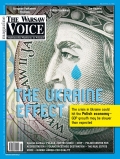

The Warsaw Voice | 20 listopad 2008

* Pokazana okładka tytułu jest aktualną okładką tytułu The Warsaw Voice. Kiosk24.pl nie gwarantuje, że czytany artykuł pochodzi z numeru, którego okładka jest prezentowana.
Poland Nov. 11 celebrated the 90th anniversary of regaining independence with scores of rallies and patriotic parades, but the ceremonies were marred by ongoing public bickering between the country's political leaders.
President Lech Kaczyński invited 800 people from Poland and abroad, including 16 heads of state, to his President's Gala in Warsaw's Wielki Theater, the keynote event on Independence Day, which commemorates Poland's return to the map of Europe after 123 years of foreign rule.
But neither Prime Minister Donald Tusk nor Parliamentary Speaker Bronisław Komorowski, nor even the two deputy prime ministers, Grzegorz Schetyna and Waldemar Pawlak, showed up for the event. They were protesting the fact that Lech Wałęsa, leader of the pro-democracy Solidarity movement and the country's first democratically elected president, had not been invited.
The bickering underlined the bitter feud between the governing coalition of the Civic Platform and the Polish Peoples' Party, and the president, whose twin brother Jarosław Kaczyński heads the opposition Law and Justice party.
The government's sole representative at the event was Foreign Minister Radosław Sikorski, who emphasized while speaking to the press that his ministerial duty was to "assist the president in his dealings with foreign guests."
Wałęsa's successor as head of state, Aleksander Kwaśniewski, attended the gala with reservations. "The 90th anniversary of Polish independence is a moment which should be commemorated together, regardless of sympathy, antipathy or points of view," he said. "Lech Wałęsa is an important figure in Polish history and should have been invited. At times like these, we seem incapable of rising above our divisions."
President Kaczyński, explaining his decision, complained that Wałęsa had repeatedly ridiculed him and therefore he was entitled first to an apology. "It is hard to ask any man to sit at the same table as someone who has grossly insulted him," said Kaczyński.
Prime Minister Tusk said he could not accept a situation in which a genuine hero in the fight for independence was snubbed. "The absence of Lech Wałęsa, and my presence, could give the impression that I accept the fact that Wałęsa was not invited," he explained.
For his part, Speaker Komorowski spent the day attending independence celebrations in Cracow. "I cannot get my head around the fact that it is possible to invite Kwaśniewski, yet not invite Lech Wałęsa, one of the main architects of Polish independence after 1989," he said.
Polish Independence Day was actually celebrated only twice before World War II, and then was re-instated in 1989. This year's observance began at noon in Warsaw with a ceremonial changing of the guard at the Tomb of the Unknown Soldier, followed by a parade and the official opening of an exhibition at the Royal Castle entitled, The 1920s: Faces of Modernity. Later, in the Presidential Palace, Lech Kaczyński awarded state medals and named new generals.
Among those present at the Tomb of the Unknown Soldier were German Chancellor Angela Merkel, Georgian President Mikhail Saakashvili, Lithuanian President Valdas Adamkus, and Ukrainian President Victor Yushchenko as well as the presidents of Croatia, Montenegro, Estonia, Latvia, Macedonia, Serbia, Slovakia and Hungary. Also present were Czech Prime Minister Mirek Topolanek and Jacques Barrot, vice-president of the European Commission.
Tusk did attend this part of the Independence Day commemorations. To the surprise of observers, however, both Saakashvili and Yushchenko flew home before the evening gala. Merkel's early departure had been announced beforehand.
Among Polish politicians present at the gala were Senate Speaker Bogdan Borusewicz, former Polish prime ministers Tadeusz Mazowiecki and Józef Oleksy, Warsaw Mayor Hanna Gronkiewicz-Waltz, Wojciech Olejniczak, head of the Democratic Left Alliance parliamentary group, and Przemysław Gosiewski, head of the Law and Justice parliamentary group.
"The Second Republic, which we recovered 90 years ago, was a great good which gave birth to a generation of patriots and must not be forgotten," Lech Kaczyński said in a speech. "It was a country that lasted only one generation, but it was a country which will live on forever in our history." He noted that the Second Republic "had to fall under the combined onslaught of two superpowers, Germany and Soviet Russia, but the generation it spawned was one of the greatest in history."
The president described patriotism as "a positive value, even in a Europe which is uniting," but added that even in a united Europe of great solidarity, there exists competition among nations. "Large countries-and we are one ourselves-must defend their interests effectively, while also defending those of smaller countries," he said.
"We were triumphant 90 years ago. We were triumphant 20 years ago [when communist rule was replaced by democracy]. I am sure that we will also triumph in the future," he concluded.
Witold Żygulski
 Wróć do czytelni
Wróć do czytelni